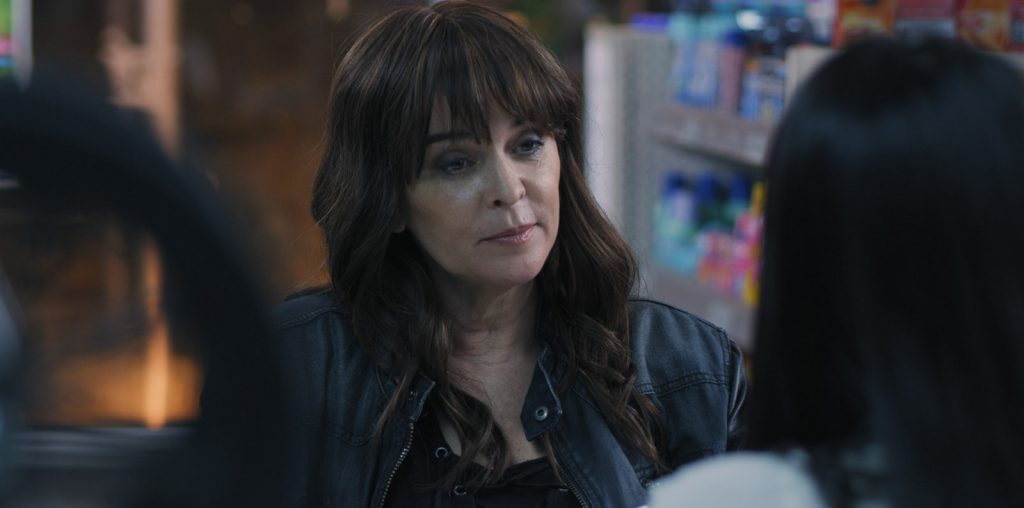
If any collaboration of two auteurs left viewers curious for an encore, it would be “Paris, Texas” (1984). Shepard, the playwright who wrote the script with director Wenders’ close collaboration, dreamed up a landscape perfect for the latter’s exploration of the American Southwest. The writing stage was one of experimentation: Shepard built the script from a starting point – an amnesiac wanderer emerging from the desert near the Mexican/US border – and moved forward without a set story or ending in mind. With pacing that rewards the patient viewer, the exploratory narrative epitomizes Wenders’ restrained style. The collaborators’ journey molded the contemplative story of Travis (Harry Dean Stanton) and his struggle to regain his memory and find his abandoned family. Both known for developing characters through deliberate pacing, Shepard and Wenders made the viewer “feel” Travis’ gradual return from isolation.
The previous work of Wenders and Shepard brought them directly to “Paris.” In a series of prior films Wenders, a force of the German New Cinema, honed quite an aesthetic for the road movie. His 1973 film, “Alice in the Cities,” joins a wandering reporter with an abandoned child for a sensitive look at Germany. Two later projects, “Wrong Move” (1975) and “Kings of the Road” (1976), which along with “Alice” complete what’s described as Wenders’ “Road Movie Trilogy,” also detail the necessity for flight. With a strong body of experimental stage work in the 1960s and early ‘70s, including the post-apocalyptic rock opera “The Tooth of Crime,” Shepard gained universal recognition with his Pulitzer Prize-winning tragedy “Buried Child” in 1979. The play featured a family that, instead of driving a narrative, languishes in an emotional wasteland. Any actions that suggest a plot slowly move the disconnected folk towards a final inevitable revelation.
It’s easy to see why Shepard and his thoroughly American sensibility attracted Wenders. Having already found unique treatments of genre films with the noirs “The American Friend” (1977) and the botched but still successful fictionalized biopic, Hammett (1982), Wenders found in Shepard a porthole into rugged Americana. Similarly, Wenders’ slow but sure hand provided an expansive landscape for Shepard. With Wenders, Shepard could present familial crisis, a recurring theme of his stage work, through Travis’ extensive journey toward reconciliation.
When the two reunited for “Don’t Come Knocking” (which premiered at Cannes in 2005 but was released this year) to collaborate as they did on “Paris, Texas,” the subject of a film star deserting production was familiar territory. Wenders had already toyed with the mishaps of a struggling film crew hunting for new funds to realize its vision in “The State of Things” (1982). Shepard employed western sensibility in his tour de force stage drama about the creative struggle, “True West” (1980). This minimalist piece features two brothers battling while co-writing a western screenplay, one a professional scriptwriter, and the other a vagrant who claims to have the real know-how to capture the West. For both Wenders and Shepard, the interrupted creative process in “Don’t Come Knocking” was at the end of a well-worn path.
Shepard takes up Stanton’s role of the wanderer, Howard Spence, who drops out of his film role to escape his reckless lifestyle. With a detached but determined air about him, Shepard’s Spence cannot match Stanton’s docile innocence that supports the quiet narrative of “Paris, Texas.” Stanton’s Travis wakes from a near-catatonic state to start out fresh, while Shepard’s protagonist drops out in haste and never provides room for introspection. Once described as “the thinking woman’s beefcake” by biographer Don Shewey, Shepard now resembles his literary predecessor, Samuel Beckett, with a look of age and slight bewilderment that’s penetrating and couched in a boyish, shaved haircut. (The documentary “This So-Called Disaster,” about Shepard’s 2000 theater production as writer/director, captures a foggy but determined Shepard in real life.) A latter-day Beckett, Shepard suits his character’s escape and its humorous absurdity, but cannot portray the necessary depth for such a performance.
The narrative that unfolds in the wake of Spence’s journey recalls “Paris” but walks too heavy for a character study to gel. Spence eventually returns to people who have less of an understanding as to why he’s arrived than he does. He heads to Elko, Nevada to find his mother (Eva Marie Saint), who has not heard from him since he became a star 30 years prior but welcomes him nonetheless. This disorienting reunion works since she appears close to dementia, which we can imagine Spence inhabiting one day. Once staying with her, she informs him of his illegitimate child. (If Spence never new about it or just plain forgot, we aren’t sure.) In this plot development straight from the Shepard canon, the viewer sees the smoke signals for family drama rising high – and even moreso once a seemingly lost young woman named Sky (Sarah Polley) appears with an urn containing her mother’s ashes.
From here, “Knocking” delivers a steady first act which extends until you realize there won’t be a second or third. The narrative turns episodic once Spence departs Elko for Butte, Montana to find his family in what seems like an attempt to save himself. The city of Butte was much livelier when Spence starred in a big western production there 25 years earlier. He now finds a ghost town and his old fling, a waitress named Doreen (Shepard’s real-life wife, Jessica Lange). She meets him with friendly indifference before she points out their son, a musician whose performance captures the moody rock sensibility of many Shepard dramas.
The plot receives some motivation with the appearance of Sutter (Tim Roth), an investigator hired by the stalled film production in contractual crisis after Spence’s abandonment. In a characterization both obsessive and sleazy, Roth makes good use of his screen time but does not quite register as comic relief.
In Spence’s family reunion, Lange plays restrained until, in clean break of character, she cannot avoid some scenery chewing. Shepard underplays Spence as a childish father so much that he seems inactive while others act upon him. His inaction leaves him too confused to become the enigmatic discoverer Wenders strives for here. As Spence’s despicable son, Gabriel Mann has a neo-Keith Richard’s energy but is too stilted at the crucial moments. Even in a ghost town, the awkward interplay of these tortured folks seems to crowd things up.
Similarly, Wenders’ reunion with Shepard plays like a fresh but uneven recipe. With so much stunningly photographed landscape and an ache-inducing T-Bone Burnett score, Wenders struggles to unify his moody narrative. Wenders and Shepard seem to share too much interest in each other’s sensibility, and thus “Don’t Come Knocking” walks away as a child of an incestuous match.

